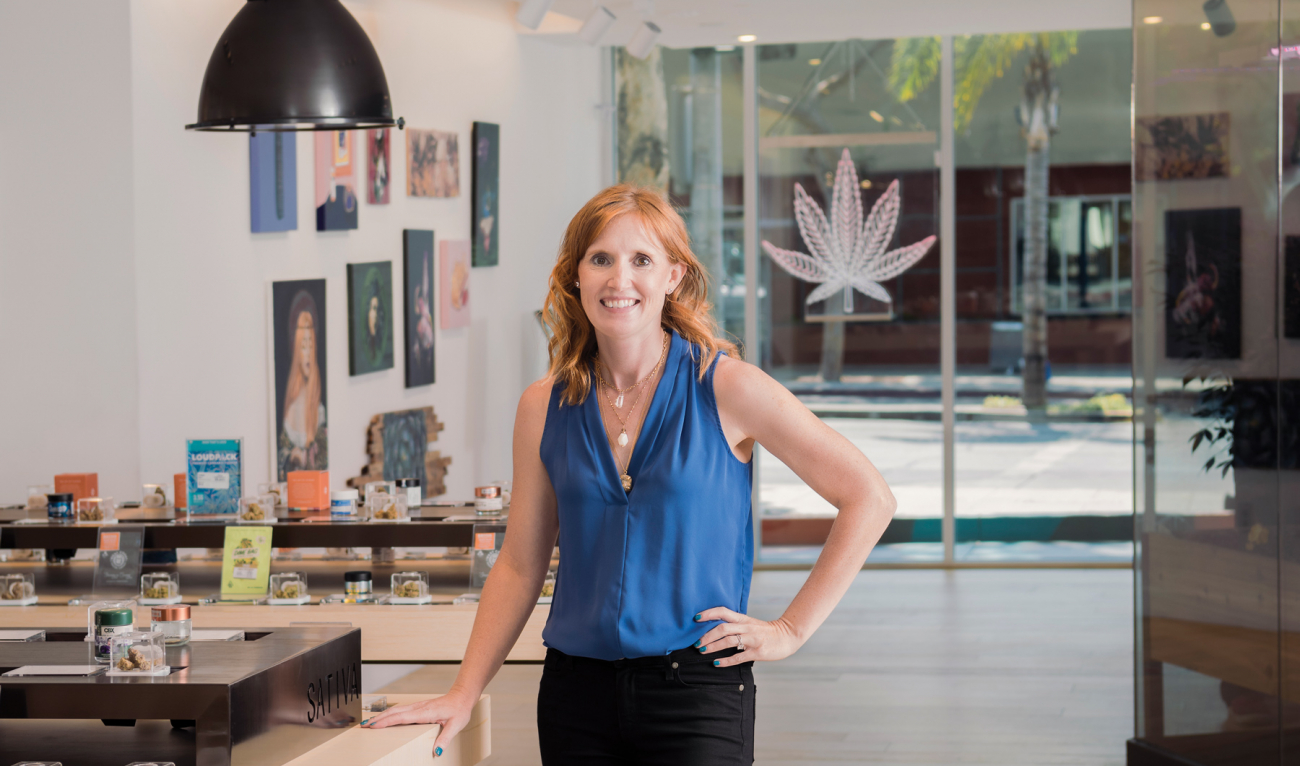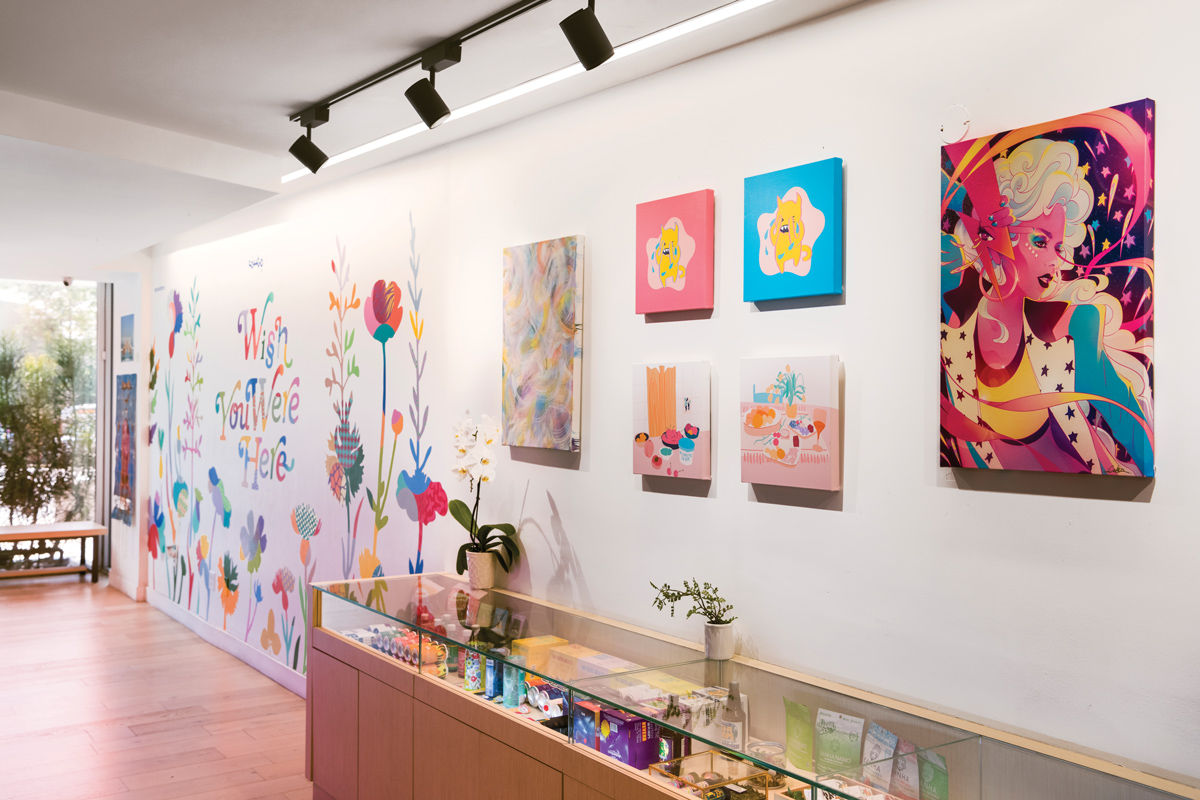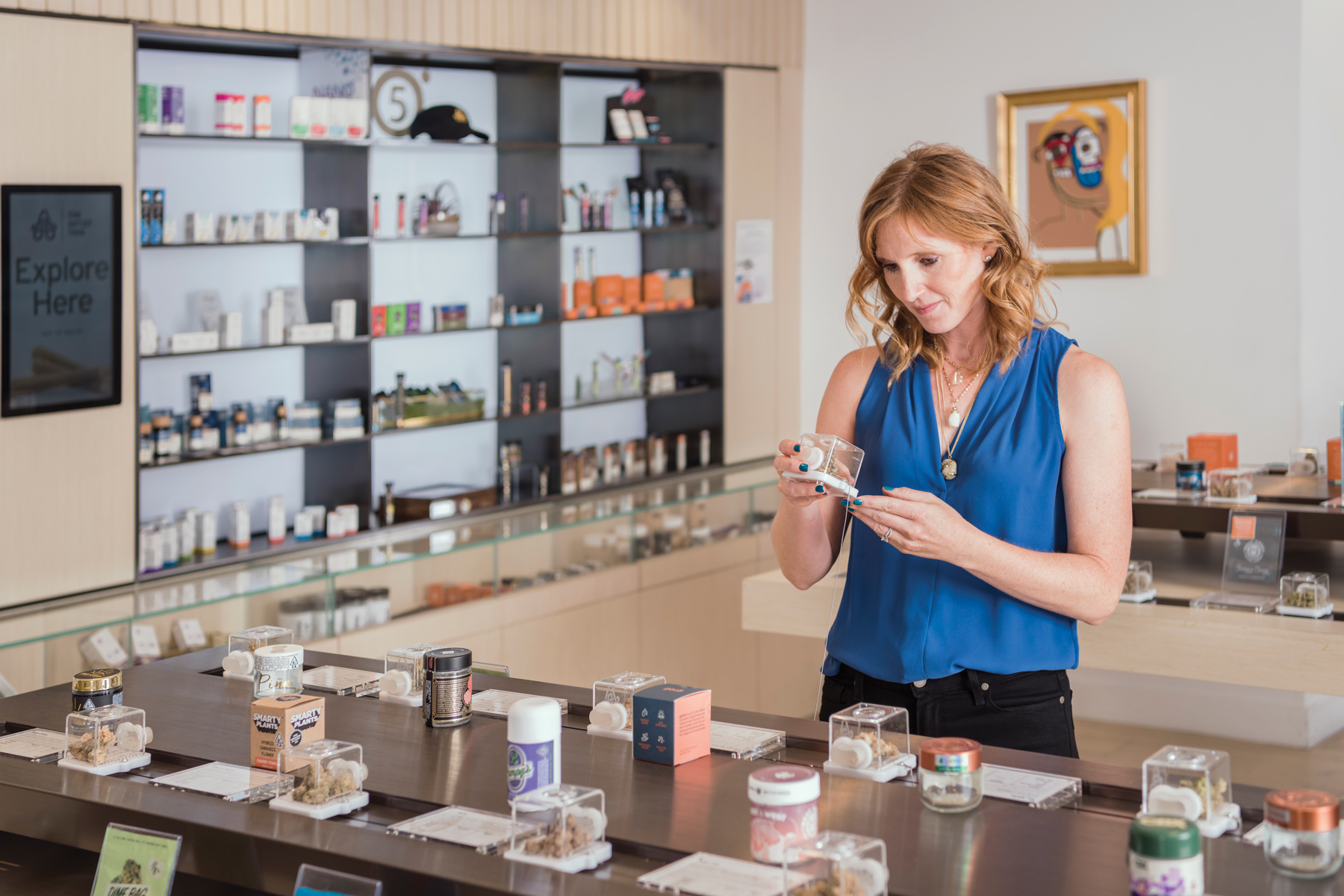The New Counter Culture
During the past decade 19 states have legalized recreational marijuana, with more waiting in line. No longer a shadowy world of illicit transactions, dealing marijuana has gone mainstream and been transformed into a modern—and legal—marketplace.
On the cutting edge of cannabis retail is Lauren Fontein, co-owner of The Artist Tree, a rapidly expanding network of posh stores in the Los Angeles area. California, the first state to legalize medical marijuana—in 1996—is the epicenter of the U.S. marijuana retail industry, with more than 700 retailers and a market that’s projected to reach $5 billion next year. Fontein’s business sheds light on an intriguing question: What happens when a black-market commodity leaps into the light of normal daily commerce?
On a recent day Fontein was busy in the company’s office, working on licensing applications. Trim and energetic at 41, she comes off as more corner office than countercultural. After graduating with a degree in psychology, Fontein went to law school at UCLA, then joined Latham & Watkins, a big L.A. law firm. She quickly found the career unrewarding. “It was very corporate and not very personal,” she says. “I wanted to feel passionate about what I was doing.”
She dreamed of opening a cookie shop and in 2009 quit her job and took a professional baking and pastry course. Her boyfriend, Avi Kahan—the two met in law school—had a brother who had opened a medical marijuana dispensary. Mitch Kahan asked Fontein if she could make pot cookies for him. She did. “The cookies were amazing,” he says.
A reliable edible was very much in need. “The industry back then was unregulated, and there were unscrupulous characters,” Mitch Kahan adds. “Companies selling edibles would just make up the numbers. You’d have this big piece of cake advertised as having 400 milligrams of THC, and we’d get it tested and it might have only 20 milligrams. I told Lauren there was a huge space in the industry for a brand that can actually be trusted.”
Fontein spent most of the next decade making marijuana cookies, candies, and brownies, which she sold to dozens of dispensaries. She hired help and baked in a commercial kitchen. When California approved recreational pot in 2016, she naturally segued into the retail business. In 2018 she and Avi—now the father of her three children—joined Mitch and a friend, Aviv Halimi, to open The Artist Tree in a former West Hollywood shoe store and fitness studio. More branches followed in Beverly Hills and Koreatown, and they now have six locations.
Their state-of-the-art cannabis emporiums offer an astonishing array of offerings. Smoking remains central, and the budtender at The Artist Tree can recommend a wide range of flower. Shoppers can also find extracts, sublingual tablets, topical creams, tinctures, drinks, and a huge range of edibles—from fleur de sel cannabis chocolates and passionfruit guava gummies to ginger lemongrass chai. “When cannabis became legal for recreational use in California the market totally blossomed,” Fontein says. “We have 700 unique products in our store at any given time.”
“We have 700 unique products in our store at any given time.”
The vast range mirrors the different types of consumers. “There’s still your traditional marijuana user,” she says, “but maybe you’re an older person looking for pain relief, maybe you don’t want to get high at all but just want to sleep better or feel relaxed, or maybe you want the strongest thing we carry, our flower with the highest THC percentage. There’s so many things you can do now.”
Los Angeles hosts hundreds of dispensaries, and the competition is fierce. “We needed to make our place a destination,” Fontein says. “Any retail business that wants to succeed nowadays, cannabis or anything else, has to provide an experience.”
Retail outlets in the Los Angeles area push a wide variety of themes for the cannabis shopping experience. Some store names suggest relaxation and nature (Calma, Serra). Others appeal to luxe travel and shopping (Boutiq Venice). Customers at a Culver City dispensary, The High Note, enter via a waiting-room door hidden in a faux bookcase—a speakeasy approach that nods to pot’s illicit history.
To distinguish The Artist Tree, Fontein and her partners elected to have their stores double as art galleries. “There’s a natural synergy between the arts and cannabis,” Fontein says. “We thought it would be cool to highlight that.” The Artist Tree’s website opens with a video loop of colorful paints swirling together in vivid psychedelic patterns. The website invites prospective visitors to enjoy “immersive experiences and one-of-a-kind destinations for cannabis learning, shopping, art, and—dare we say—getting high.” The vision for the business and its future is expansive: dining experiences crafted around edibles, live music, yoga and wellness classes, artwork and plants on display and for sale.
During the summer the West Hollywood store showcased the work of eight artists, including Scott Lewallen, who works under the name Sküt. (He also cofounded Grindr, the social networking app). Lewallen got involved with The Artist Tree when it put out an open call for a Pride Month exhibit. What sets The Artist Tree apart, he says, is the beauty of the stores—he calls the West Hollywood flagship “surreal and stunning, like you’ve been transported into some other reality”—and the carefully curated experience it offers. “You are greeted by sincere and lovely humans who personally guide you through the space, know every detail about each product, provide recommendations based on your taste, and allow you to appreciate unique art that’s craftily woven into your retail experience,” Lewallen says.
With black-painted ductwork, whitewashed walls, and gleaming display cases, each Artist Tree shop also evokes the ambiance of an art venue, café, jewelry store, or parfumerie. Pristine by design, it’s the Apple Store of weed.
“There’s still a stigma against cannabis use, and some people worry that it’s not safe to have a dispensary nearby,” Fontein says. Successfully countering those concerns helped The Artist Tree win the first cannabis retail license in Riverside County, which ranked the company first among 119 applicants that bid to open marijuana stores or cultivation businesses there. County planning director John Hildebrand calls the expansion of cannabis outlets “a sensitive issue” in his community, citing the illegal operators that have plagued the county for years. “They are awful, they’re completely unregulated, and they create all sorts of problems—garbage, noise, things happening at all hours of the night. For law enforcement it’s like whack-a-mole.” Fontein’s group was the perfect antidote, he says. “They showed exactly the sensitivity, professionalism, and cooperation we were looking for.” Such sensitivity is central to The Artist Tree’s business plan. “We want to have a bright, welcoming vibe in our stores,” says Fontein. “We’re trying to break down stereotypes about what a weed dispensary is.”
This fall at its West Hollywood flagship, The Artist Tree is opening the first of its smoking lounges, which will incorporate music, relaxation, and performance. The city chose The Artist Tree from more than 100 applicants for the highly coveted license. Given lingering wariness among the public, the owners’ decision to orient their store around art meshed well with the community’s priorities. “West Hollywood is a very art-centric city,” Fontein says. “It’s vibrant, and colorful and diverse, and civic leaders really want to promote it as a destination for art. They liked that we were going to highlight that.”
The Artist Tree homepage announces the smoking lounge with a phantasmagorical slew of images. Marijuana plants bathed in purple light. A swanky, 1960s-futuristic living room. Assorted packaged edibles. Truffle fries and artisanal pizza. And, finally, a carefully composed photo of a guy with a man bun lying on a yoga mat in an outdoor SoCal surrounding (semi-arid hillside, cacti in the garden), holding aloft on his bare raised feet a woman in an exercise outfit who stretches out horizontally while smoking a joint. Funky, hippie, healthy, upscale, and foodie all at once, it is a vision of the good life in the new age of cannabis. “Finally,” the website coyly purrs, “your kind of joint.”
A big seller at The Artist Tree is a strain of flower called Cereal Milk. “Its high is a mix of the stoniest stone to the happiest high,” Fontein enthused in a recent issue of Los Angeles Magazine, “making it perfect for any occasion.” Could she be the Martha Stewart of pot? Fontein chuckles but says she sometimes tires of having to justify weed by pointing out its health and medicinal benefits. “With alcohol, no one is trying to convince you that it’s healthy to drink,” she says. “People just accept it. We’re not there with cannabis yet, but we will be. My kids are little now, but by the time they’re 18 it will be completely normal.”
As for her personal pot CV, the first time she inhaled was at Dartmouth. “We’d go down to the river at night, go for walks on the golf course. It was a great place for getting high,” she admits. Living in New York City and later in Los Angeles, she came to view sharing the occasional joint as “a normal staple of social life.”
But as a staple of professional life? Fontein’s parents initially expressed skepticism about their daughter’s career change. “It was definitely a shock to them,” she says. “My mother was like, ‘What are you doing? What happened to being a corporate lawyer?’ She was worried about what people would think.” In time her parents came to embrace the move. “They see how beautiful our stores are,” says Fontein. “They appreciate our hard work.”
Her law training hasn’t gone to waste. Fontein spends much of her time doing legal work: writing licensing applications, drafting leases and provider contracts, and dealing with the intricacies of a fledgling and highly regulated industry. She recently crafted a 200-page application for a license in Chico, near Sacramento. “The cannabis industry here has become extremely complicated, and the requirements to get licenses are onerous,” she says. “You actually really need a lawyer.”
Fontein also provides legal help to minority entrepreneurs trying to enter the retail market. As the country reckons with the draconian drug laws of past decades and the mass incarceration that resulted, there’s a broad move to build equity into the nascent industry to balance the ledger. “There’s a lot to make up for,” Fontein says. “Doing right by groups disproportionately impacted by prior laws is a really important part of the industry now. Everyone in it has a responsibility to foster ownership opportunities.” To that end, The Artist Tree’s Koreatown outlet is owned jointly with a partner who had a prior marijuana conviction. Fontein also does pro bono legal work for people applying for social-equity licenses and sometimes helps them secure loans.
The Artist Tree, with a dozen new locations in various stages of planning, currently boasts more than 50 employees, a thousand customers a day, and a projected $42 million in sales for this year. Lewallen, the artist, isn’t surprised the company is flourishing. “Los Angeles is the capital of the cannabis industry in the state and there are a lot of players,” he points out. “The Artist Tree is really different from everyone else. They’re the best. Lauren in particular has been a dream. She is a savvy businessperson who values art and understands the value of company culture.”
Mitch Kahan enjoys recalling Fontein’s start in the industry, when she was his star baker. “Every year at Christmas she would bake cookies that were not infused with cannabis and bring them to the different stores,” he says. “Our employees would beg her to bring more. Lauren is a fantastic chef. She bakes, she cooks. She does it all.”
The April 20 holiday that celebrates pot, known as 4/20 Day, reminds Fontein why she delights in her curious career change. “It’s our busiest day of the year,” she says. “I always work at the store on that day—answer the phones, help put orders together, work with the staff. It’s a blast.” The work experience at The Artist Tree stands in stark contrast to her years at the law firm, which she found competitive and cutthroat. “I love the weed community,” she says. “Everyone is helpful and friendly and wants to work together. I feel fortunate that this is what I get to do as my job. Honestly, I sometimes wish I could just be a budtender. It’s not stressful. It’s just a fun industry. People are happy when they come into your store.”
RAND RICHARDS COOPER wrote about Isalys Quiñones ’19, Th’20, in the July/August issue of DAM.
Photographs by Peter Bohler ’03













